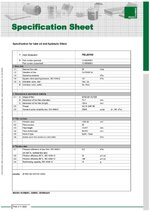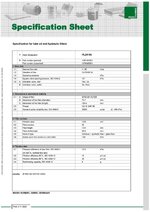You are using an out of date browser. It may not display this or other websites correctly.
You should upgrade or use an alternative browser.
You should upgrade or use an alternative browser.
Purolator Boss PBL20195, One PL20195 Specification Sheet
- Thread starter fantastic
- Start date
[QUOTE="I Ouch
[/QUOTE]
We've been sold on the marketing for far too long. That's my explanation on why this looks "Bad" to some. Are there other filters tested to last 20,000 miles that have better efficiencies & an individual Spec sheet to show?
[/QUOTE]
We've been sold on the marketing for far too long. That's my explanation on why this looks "Bad" to some. Are there other filters tested to last 20,000 miles that have better efficiencies & an individual Spec sheet to show?
- Joined
- Oct 25, 2021
- Messages
- 1,204
We've been sold on the marketing for far too long. That's my explanation on why this looks "Bad" to some. Are there other filters tested to last 20,000 miles that have better efficiencies & an individual Spec sheet to show?
Length of time is irrelevant above 5k miles.
- 99% @ 46 Microns
- 50% @ 22 Microns
is pretty bad
[QUOTE="I Length of time is irrelevant above 5k miles.
is pretty bad
[/QUOTE]
But how is it "Pretty Bad" for 20,000 mile interval? That is very relevant b/c it's a 20k mile rated oil filter. How can you discount the efficiency rating based on your own 5k mile relevance on a 20k mile filter? If someone runs their filters past 5,000 miles filter efficiency becomes irrelavant?
- 99% @ 46 Microns
- 50% @ 22 Microns
is pretty bad
[/QUOTE]
But how is it "Pretty Bad" for 20,000 mile interval? That is very relevant b/c it's a 20k mile rated oil filter. How can you discount the efficiency rating based on your own 5k mile relevance on a 20k mile filter? If someone runs their filters past 5,000 miles filter efficiency becomes irrelavant?
Last edited:
My question would be “why”. Just so you can say you’re the boss? Why would you use this?
- Joined
- Oct 25, 2021
- Messages
- 1,204
Time is irrelevant of efficiency. In addition, it's even worse because now you have crappy efficiency and running more miles on not as good filtration so more time for the larger particles to potentially cause wear.But how is it "Pretty Bad" for 20,000 mile interval? That is very relevant b/c it's a 20k mile rated oil filter. How can you discount the efficiency rating based on your own 5k mile relevance on a 20k mile filter? If someone runs their filters past 5,000 miles filter efficiency becomes irrelavant?
One can have good filtration efficiency and be an extended interval filter. You don't have to have one or the other. In this case, the Boss doesn't do very good.
These filters have remarkably low restriction. The pressure drop is only 0.9 psi at a pretty high flow rate with pretty thick oil (25 L/min with 24 cST oil). For reference, the older FRAM Ultra XG10575 and Purolator BOSS PBL22500 tested by Ascent some years back were around 8 times more restrictive.
The restriction is so unnecessarily low that I wonder why they wouldn't use a finer filter media to trade some of that flow performance for better efficiency. The low initial restriction wouldn't even help much with dirt holding capacity since pressure drop rises exponentially as a filter gets clogged.
These filters would make for good rock-catchers in race engines. The low restriction would free up a bit of power, and they'll never bypass to let bits of engine past when an engine component is failing.
The restriction is so unnecessarily low that I wonder why they wouldn't use a finer filter media to trade some of that flow performance for better efficiency. The low initial restriction wouldn't even help much with dirt holding capacity since pressure drop rises exponentially as a filter gets clogged.
These filters would make for good rock-catchers in race engines. The low restriction would free up a bit of power, and they'll never bypass to let bits of engine past when an engine component is failing.
[QUOTE="I Time is irrelevant of efficiency. In addition, it's even worse because now you have crappy efficiency and running more miles on not as good filtration so more time for the larger particles to potentially cause wear.
One can have good filtration efficiency and be an extended interval filter. You don't have to have one or the other. In this case, the Boss doesn't do very good.
[/QUOTE]
Where are you getting there is no relevancy with oil filter efficiency to mileage? Where is there evidence there are better filter efficiencies for just as long of mileage. Do you have some data to back that up?
One can have good filtration efficiency and be an extended interval filter. You don't have to have one or the other. In this case, the Boss doesn't do very good.
[/QUOTE]
Where are you getting there is no relevancy with oil filter efficiency to mileage? Where is there evidence there are better filter efficiencies for just as long of mileage. Do you have some data to back that up?
@fantastic
Which email address did you use to request these spec sheets? I've sent a couple of requests lately but haven't received a response. If you request any more, could you ask for the spec sheet for the PurolatorOne PL14460?
Which email address did you use to request these spec sheets? I've sent a couple of requests lately but haven't received a response. If you request any more, could you ask for the spec sheet for the PurolatorOne PL14460?
Real bright there bud... It's an oil filter after all. A premium 20,000 mile rated one at that.My question would be “why”. Just so you can say you’re the boss? Why would you use this?
I'm working on this for you asap!@fantastic
Which email address did you use to request these spec sheets? I've sent a couple of requests lately but haven't received a response. If you request any more, could you ask for the spec sheet for the PurolatorOne PL14460?
Yes this shows you have something else here.Real bright there bud... It's an oil filter after all. A premium 20,000 mile rated one at that.
- Joined
- Oct 25, 2021
- Messages
- 1,204
If a filter isn't efficient, then time on it is a moot point and it becomes worse the longer the filter is in use, like I already said due to larger particles not being captured and spending more time in circulation. No one has ever argued they want a less efficient filter in a mainstream passenger application....that literally boggles the mind.Where are you getting there is no relevancy with oil filter efficiency to mileage? Where is there evidence there are better filter efficiencies for just as long of mileage. Do you have some data to back that up?
The Fram Ultra, Titanium and Endurance (and other similar synthetic/synthetic blend media filters) all have better efficiency and are all rated for 15-20K or more miles.Where are you getting there is no relevancy with oil filter efficiency to mileage? Where is there evidence there are better filter efficiencies for just as long of mileage. Do you have some data to back that up?
Last edited:
I'm betting you've seen this data before.We've been sold on the marketing for far too long. That's my explanation on why this looks "Bad" to some. Are there other filters tested to last 20,000 miles that have better efficiencies & an individual Spec sheet to show?
Would you all like to see ISO 4548-12 Oil Filter Lab Testing Comparison, Efficiency & Capacity, Pressure vs Flow, Bubble Point, and Burst?
I have this as a “watched” thread, so if you do happen to start a new one, could you put a note or link in this one to direct followers to the new thread? Thanks!! Yes, no problem I can do that.
bobistheoilguy.com
I One can have good filtration efficiency and be an extended interval filter. You don't have to have one or the other. In this case said:187138[/ATTACH]
Last edited:
Is 50% efficiency at 22u considered "premium"?It's an oil filter after all. A premium 20,000 mile rated one at that.
@fantastic ... since you seem to have a good contact at Purolator/M+H, could you ask him what the "Nominal Flow Rate" in the spec sheets is based on? What are the parameters associated with that "Nominal Flow Rate" spec (oil viscosity, delta-p at what flow)?
Similar threads
- Replies
- 26
- Views
- 3K
- Replies
- 2
- Views
- 2K
- Replies
- 25
- Views
- 1K
- Replies
- 4
- Views
- 757


